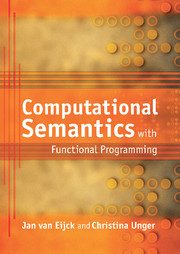Book contents
- Frontmatter
- Contents
- Foreword
- Preface
- 1 Formal Study of Natural Language
- 2 Lambda Calculus, Types, and Functional Programming
- 3 Functional Programming with Haskell
- 4 Formal Syntax for Fragments
- 5 Formal Semantics for Fragments
- 6 Model Checking with Predicate Logic
- 7 The Composition of Meaning in Natural Language
- 8 Extension and Intension
- 9 Parsing
- 10 Handling Relations and Scoping
- 11 Continuation Passing Style Semantics
- 12 Discourse Representation and Context
- 13 Communication as Informative Action
- Afterword
- Bibliography
- Index
10 - Handling Relations and Scoping
Published online by Cambridge University Press: 05 June 2012
- Frontmatter
- Contents
- Foreword
- Preface
- 1 Formal Study of Natural Language
- 2 Lambda Calculus, Types, and Functional Programming
- 3 Functional Programming with Haskell
- 4 Formal Syntax for Fragments
- 5 Formal Semantics for Fragments
- 6 Model Checking with Predicate Logic
- 7 The Composition of Meaning in Natural Language
- 8 Extension and Intension
- 9 Parsing
- 10 Handling Relations and Scoping
- 11 Continuation Passing Style Semantics
- 12 Discourse Representation and Context
- 13 Communication as Informative Action
- Afterword
- Bibliography
- Index
Summary
Summary
In this chapter we will interpret verb phrases as relations of various arities, using a type of arbitrary arity relations. The problem of encoding relations in type theory in such a way that the usual logical operations can be applied to them (relations should be ‘conjoinable’, as the jargon has it) has been studied extensively in the semantic literature. We will define conjunction, disjunction, and complementation on our relational types. Next we turn to the interpretation of determiner phrases as functions from (n+1)-ary relations to n-ary relations, the interpretation of m-ary sequences of determiner phrases as functions from (n + m)-ary relations to n-ary relations, and to the handling of scope reversal for such functions.
Interpreting NP Lists
Instead of analysing the sentence Every unicorn ate a lettuce leaf as a relation between the CN property of being a unicorn and the VP property of eating lettuce leaves (namely the relation of inclusion), it is also possible to look at the complex expression Every unicorn _ a lettuce leaf, and interpret that as a function that takes a relation (a denotation of a transitive verb) and produces a truth value. Similarly, Every unicorn was fed a lettuce leaf by some fairy can be analysed as stating that the set of unicorns is included in the set of entities that were fed a lettuce leaf by some fairy, but it is also possible to look at the complex expression Every unicorn _ a lettuce leaf by some fairy, and even at Every unicorn _ a lettuce leaf _ some fairy.
- Type
- Chapter
- Information
- Computational Semantics with Functional Programming , pp. 261 - 286Publisher: Cambridge University PressPrint publication year: 2010

